"I think [philanthropy] is a muscle that needs to be flexed. And it's not necessarily always comfortable—so it's better to start early."
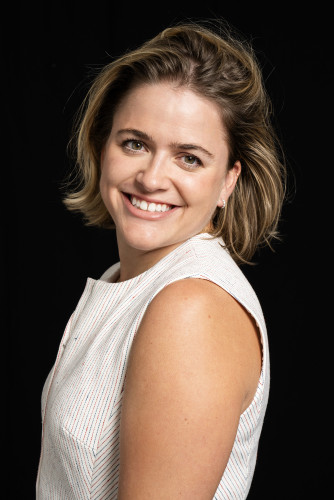
Lillie Belle Viebranz Renner, C’15, is a self-described “people person”—but she has no problem stepping back and observing, rather than taking charge of conversations. “Someone once told me that I’m a sponge,” she says. “I thought that was the greatest compliment.” Renner credits Sewanee with providing valuable mentors and growing her networking skills. After entering the workforce as a receptionist at Palantir, a technology company that empowers large organizations to better understand their data, Renner quickly shifted into a chief of staff role. She eventually led Palantir’s partnerships for its Research & Development team before transitioning in 2023 to her current role as director of investment operations at Snowpoint Ventures, a venture capital firm that invests in dual-use companies which are operating across both the government and commercial sectors. Having pivoted several times in her career, she says, “I believe that if you’re not learning at your job, it’s probably not the right place for you.”
Both Lillie Belle and her husband, Hurst Renner, C’13, are longtime Sewanee Fund supporters, and they also regularly contribute to the Cumberland Plateau Scholarship Endowment Fund, a pool of endowed funding that enables need-based scholarships for students from the Plateau region. The fund was established by Lillie Belle and her parents, Curt and Cissy Viebranz, P’15, in 2016. As young alumni who have consistently increased their University giving through the years, the Renners are now part of Sewanee’s Breslin Society. Vice President for University Relations Deborah S. Vaughn, P’20, describes the society as a way to recognize generous alumni while acknowledging the varying capacity levels of recent Sewanee graduates. “Membership in the Breslin Society is based on both annual giving level and the number of years that have elapsed since a donor graduated,” she says. “We really want to highlight and honor alumni who are making their best gifts, whether they said farewell to Sewanee last year or 50 years ago.”
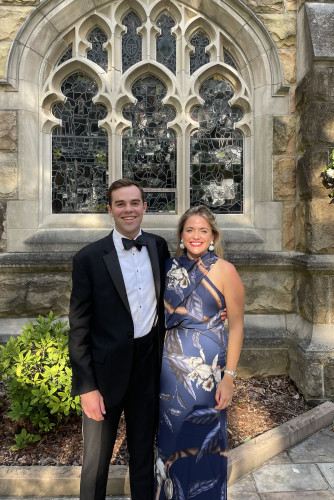
at Sewanee for a wedding
It’s fair to say that networking guided Renner toward Sewanee, though she wasn’t the one who initiated the outreach. The summer before her junior year of high school, she was visiting her brother at McCallie School in Chattanooga when she met Jay Fisher, C’79, P’11, P’13, P’16, P’21, Sewanee’s secretary of the governing boards. At the time, Fisher was new to the role of acting dean of admission, and he was promoting Sewanee at McCallie. “He handed me his business card,” Renner says, “and said, ‘My first Sewanee recruit!’” Not thinking much of it, Renner filed the card away, but she kept the University on her radar. The following year, she toured the campus as part of a whirlwind trip that took her to, in her words, “six colleges in six states in six days.” Renner says she was instantly enchanted by the Domain. She also felt a family connection to the Mountain—her great aunt, the Rt. Rev. Mary Adelia Rosamond McLeod, T’80, attended the School of Theology and was the first female bishop to lead an Episcopal diocese.
Renner was quickly drawn to majoring in international and global studies. “I have long loved to travel,” she says. Though she is originally from Chester, New Jersey, she attended high school as a boarding student at the Taft School in Watertown, Connecticut, and spent significant time in Africa before matriculating at Sewanee. “Right before my freshman year of high school, I went on a trip to Zambia that was very transformational for me, in terms of seeing and living in another environment,” she says. After graduating from Taft, she lived in Cape Town, South Africa, and worked for a nonprofit. “I feel a pull for learning and understanding our world and other societies and cultures.”
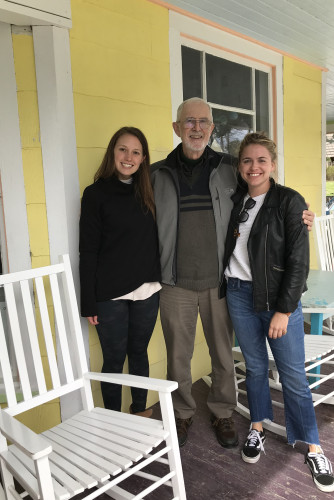
Religion Gerald Smith, P'15, and Renner
enjoying a reunion at Stirling's in 2021
Through various conversations during her sophomore year at the University, Renner became interested in exploring the scope and effects of human trafficking. Along with engaging in independent research on the topic as part of her major, she worked closely with Professor of Art and Samuel R. Williamson Distinguished University Chair Pradip Malde to create a presentation combining visual elements with details about the nature of human trafficking in Tennessee. She shared this report during a panel discussion at Bairnwick Women’s Center, which she organized. One of the panelists was a local survivor of trafficking. “When you think about human trafficking, you think of it happening outside of the U.S.,” Renner says. “In fact, there is a huge problem with it here.” She expanded her research during a semester abroad in Buenos Aires, Argentina, where she wrote a thesis on the abduction and ultimate trafficking of Marita Verón, an Argentinian woman who was kidnapped near her home in 2002 and never found. “I looked at what could have gone differently if the government had better engaged NGOs or if the NGOs had more power behind them,” Renner says.
Outside the classroom, Renner organized and participated in a Bible study. She also played varsity lacrosse for a year, joined Theta Kappa Phi, and frequently babysat for Sewanee community members, including former Director of Annual Giving and Advancement Officer Haynes Roberts Jr., C’00, and his wife, Megan Greene Roberts, C’03. During Renner’s senior year, she engaged in Sewanee’s Canale Leaders Program through the Office of Civic Engagement, and she joined fellow Canale student Mary Ottley, C’15, in founding Sewanee Women Engaging and Empowering Community (SWEEC).
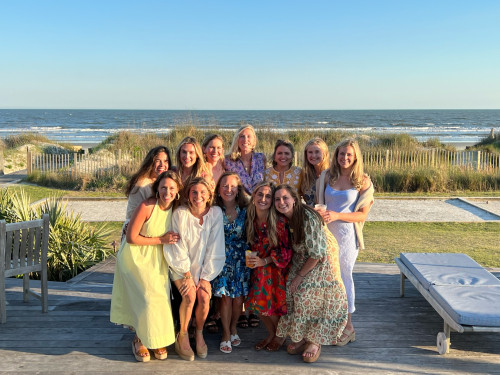
The aim of SWEEC, as described by Renner, was to facilitate connections between women at the University and in the town of Sewanee and to unite both groups as collaborators in local outreach projects. Community participants included Megan Greene Roberts, as well as Nicky Campbell, C’99, special assistant to the vice-chancellor for administration and community relations, and Bonnie Greenwald McCardell, the wife of former Vice-Chancellor John McCardell. Renner says she’s proud of the way SWEEC enabled the University’s women to “engage with the community writ large—not just the Sewanee campus, but the towns of Sewanee, Tracy City, Winchester, and all of those places outside of Sewanee that are hugely important to the Cumberland Plateau.”
The Renners’ and Viebranzes’ philanthropy similarly enhances ties between Sewanee and surrounding communities. Lillie Belle says a personal experience motivated her family to create the Cumberland Plateau Scholarship Endowment Fund. During her senior year, she watched a close friend encounter an unexpected financial aid obstacle. “There was this real moment of panic for her—was she going to be able to stay at Sewanee?” Renner says. Along with a desire to support students like her friend, Renner says she and her parents sought to “specifically focus on financial aid for students in [Sewanee’s] neighboring communities who might not be able to come to Sewanee without [aid].”
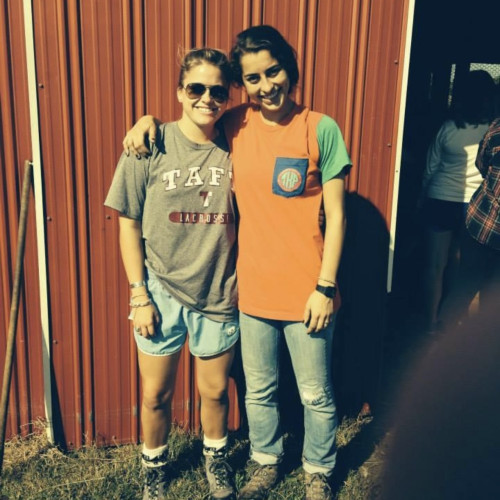
Lillie Belle and Hurst are now in the annual practice of assessing their Sewanee giving and determining if and how they can increase their support. “I think [philanthropy] is a muscle that needs to be flexed,” Lillie Belle says, “and it’s not necessarily always comfortable—so it’s better to start early.” Though the couple met at Sewanee, they didn’t start dating until they were working together in Washington, D.C. “It’s been really fun to go back to campus and create new memories together,” Lillie Belle says. “[Hurst] loves Sewanee as much as I do.” The Renners intend to return to the Mountain for Lillie Belle’s 10th reunion next year, and Lillie Belle says they’re both already thinking about the generations of Sewanee scholars who will succeed them. “I want them to experience everything I experienced. I truly feel like Sewanee was the best four years of my life.”

